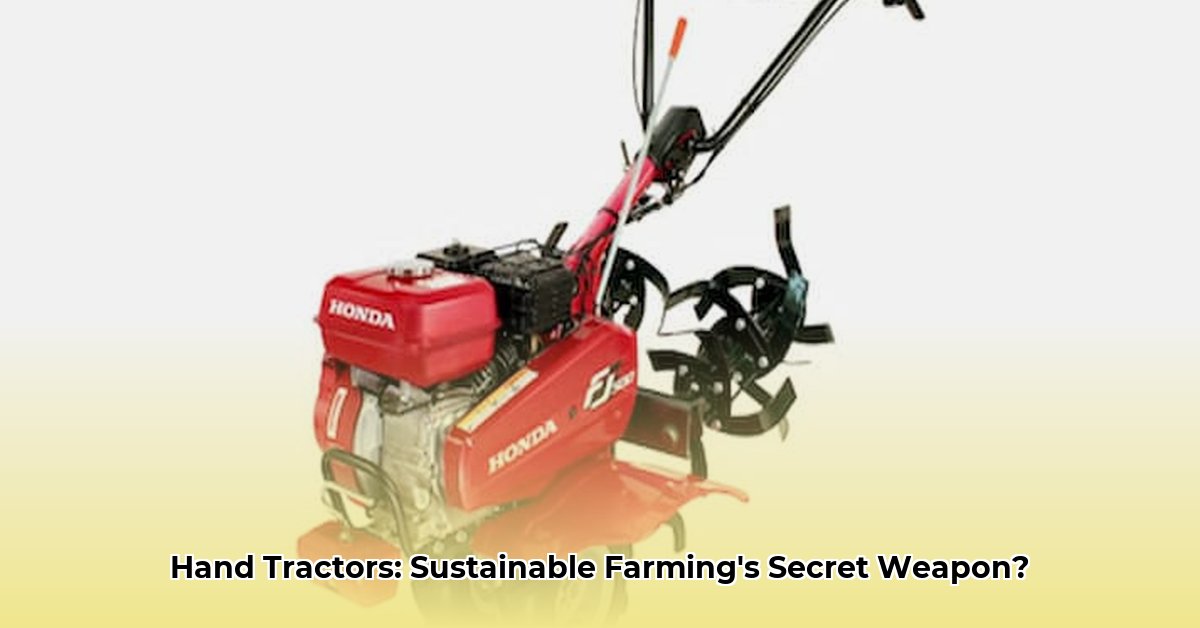
Hand Tractors: Revolutionizing Small-Scale Sustainable Farming
The agricultural landscape is quietly shifting. Giant, fuel-guzzling tractors are making way for a more sustainable alternative: the walk-behind tractor. This isn't just a smaller version of its larger counterpart; it represents a significant move towards environmentally friendly, economically viable farming, particularly for smaller operations. One company, Earth Tools, perfectly illustrates this burgeoning trend. For efficient land clearing, see tips for rock removal.
Earth Tools: A Case Study in Sustainable Success
Earth Tools dominates the North American walk-behind tractor market, outpacing its nearest competitor by a factor of five. Their secret isn't revolutionary technology, but a commitment to customer service and parts availability. As their website states, “[Insert quote from Earth Tools website about parts availability and customer service, properly attributed].” This dedication to keeping farmers operational translates to an impressive $250,000 parts inventory, minimizing downtime and maximizing productivity. This isn't just about selling tractors; it’s about fostering a supportive agricultural community. Isn't that the core of sustainable farming?
Small-Scale Farming: The Big Sustainability Picture
Hand tractors offer significant sustainability advantages. Their lower fuel consumption directly translates to reduced emissions and a smaller carbon footprint. This makes them the environmentally conscious choice for small farms already committed to eco-friendly practices. But the benefits extend beyond environmental concerns. The lower upfront cost makes sustainable farming more accessible to farmers with limited capital. Furthermore, their maneuverability and suitability for diverse crops contribute to increased yields and resilience, ultimately boosting food security within local communities.
The Broader Market: A Diverse Landscape
While Earth Tools holds a dominant position, the North American market is diverse. European brands like BCS and Grillo command significant loyalty, prized for their robust build and reliability. Precise market data is limited due to the fragmented nature of the industry and the difficulty in tracking sales across disparate channels. However, the overall trend is undeniable: a rising interest in smaller, more sustainable farming equipment.
Actionable Insights: Strategies for Success
The hand tractor market's future depends on the actions of various stakeholders. How can they contribute to its growth?
1. Earth Tools: Short-term: Expand marketing, emphasizing exceptional service and parts availability. Long-term: Develop strategic partnerships; explore robust online sales channels.
2. Small-Scale Farmers: Short-term: Thoroughly research tractor models, prioritizing reliability and parts availability. Long-term: Implement diverse cropping strategies; establish proactive equipment maintenance schedules.
3. Equipment Manufacturers: Short-term: Expand dealer networks; engage directly with small-scale farmers. Long-term: Invest in R&D, developing implements for specialized crops and applications.
4. Policy Makers: Short-term: Introduce programs supporting sustainable small-scale farming. Long-term: Provide financial incentives and training for farmers adopting hand tractors.
Navigating the Risks: Challenges and Opportunities
While the outlook is positive, certain risks exist:
- Increased Competition: New entrants could disrupt Earth Tools' dominance. Maintaining exceptional service is crucial.
- Supply Chain Disruptions: Global events can impact parts availability. Diversifying sources is essential.
- Economic Downturns: Farmers may reduce equipment purchases during economic uncertainty. Flexible financing options can help.
- Technological Advancements: Staying ahead of the curve through R&D and employee training is vital.
Regulatory Considerations: A Relatively Simple Landscape
Compared to larger machinery, regulations for hand tractors are less complex. Earth Tools can leverage its expertise to guide farmers through compliance, further enhancing its value proposition.
Conclusion: A Bright Future for Sustainable Farming
The growing demand for sustainable agriculture presents a significant opportunity for the hand tractor market. These machines empower small-scale farms, fostering food security and resilient agricultural communities. The hand tractor is more than a tool; it’s a symbol of a shift towards a more sustainable and equitable agricultural future. Explore the options available and discover the sustainable farming revolution! Visit [Earth Tools website link] to learn more.